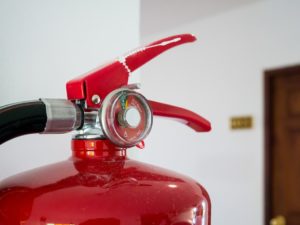Harry Woodage, expert in fire safety and electrical systems at Allsaved, discusses how businesses can improve staff safety from the risk of fire and ensure that employees understand what’s required of them in the event of a fire outbreak.
 A large number of the 22,000 fires which occur in non-residential properties every year, happen in workplaces. Faulty appliances and cables of the reason behind around a quarter of the accidental fires which break out, while misuse of equipment is another leading cause, along with smoking-related incidents. Retail distribution companies and industrial premises are the most at risk of fire breakouts, while food outlets – including restaurants, pubs and takeaways – are also in the high-risk category.
A large number of the 22,000 fires which occur in non-residential properties every year, happen in workplaces. Faulty appliances and cables of the reason behind around a quarter of the accidental fires which break out, while misuse of equipment is another leading cause, along with smoking-related incidents. Retail distribution companies and industrial premises are the most at risk of fire breakouts, while food outlets – including restaurants, pubs and takeaways – are also in the high-risk category.
Whatever the business, it’s essential to protect staff by putting in place robust fire safety plans, and training staff to understand what they need to do in terms of preventing fires, and if the worst happens and a fire does break out.
As well as the risk of injuries and fatalities, failure to comply with fire safety regulations can hit businesses in the pocket, with fines and even imprisonment of up to two years imposed.
Time for training
Since the introduction of the Regulatory Reform (Fire Safety) Order 2005, all non-residential premises have been required to carry out a fire risk assessment. The assessments are in place to ensure that appropriate fire safety prevention measures, such as correctly-located and working fire alarms, fire extinguishers and fire doors, are put in place. Plans should also include recommendations for fire protection systems, equipment, evacuation protocols and record keeping.
Once fire safety equipment and procedures are in place, it’s vital that staff know what to do in an emergency situation, and this is where good training comes in. Fire safety it not simply a matter for designated fire marshals, everyone in the organisation should realise that they have a personal responsibility.
It’s up to companies to ensure their staff are aware of emergency procedures and that employees are required to cooperate with measures to make the workplace safe from fire risk. Employees must also agree not to do anything that could place themselves or others at risk. Businesses, meanwhile, must ensure that their employees are provided with appropriate information, instructions and training about fire safety, preferably as part of a job induction, and this training should be refreshed from time to time during their employment.
Consider a course
Appointing a fire marshal, or fire warden as they’re also known, is an important first step for businesses. Marshals should be responsible for checking fire precaution measures and ensuring that fire risk assessments are up to date. It’s well worth sending fire marshals on an accredited training course.
Every building and work environment is unique, so it’s also worth considering an accredited training course for staff, specifically tailored to suit the needs of the individual company. As well as classroom-based learning, some professionals can deliver online training courses, many of them interactive with questions at the end to check your knowledge. At the other end of the spectrum, some fire safety experts offer hands-on learning. For example, giving trainees an opportunity to use fire extinguishers and tackle real fires in a controlled environment.
Fire Safety in 2023 eBook
SHP's sister site, IFSEC Insider has released its annual Fire Safety Report for 2023, keeping you up to date with the biggest news and prosecution stories from around the industry.
Chapters include important updates such as the Fire Safety (England) Regulations 2022 and an overview of the new British Standard for the digital management of fire safety information.
Plus, explore the growing risks of lithium-ion battery fires and hear from experts in disability evacuation and social housing.

 A large number of the 22,000 fires which occur in non-residential properties every year, happen in workplaces. Faulty appliances and cables of the reason behind around a quarter of the accidental fires which break out, while misuse of equipment is another leading cause, along with smoking-related incidents. Retail distribution companies and industrial premises are the most at risk of fire breakouts, while food outlets – including restaurants, pubs and takeaways – are also in the high-risk category.
A large number of the 22,000 fires which occur in non-residential properties every year, happen in workplaces. Faulty appliances and cables of the reason behind around a quarter of the accidental fires which break out, while misuse of equipment is another leading cause, along with smoking-related incidents. Retail distribution companies and industrial premises are the most at risk of fire breakouts, while food outlets – including restaurants, pubs and takeaways – are also in the high-risk category.